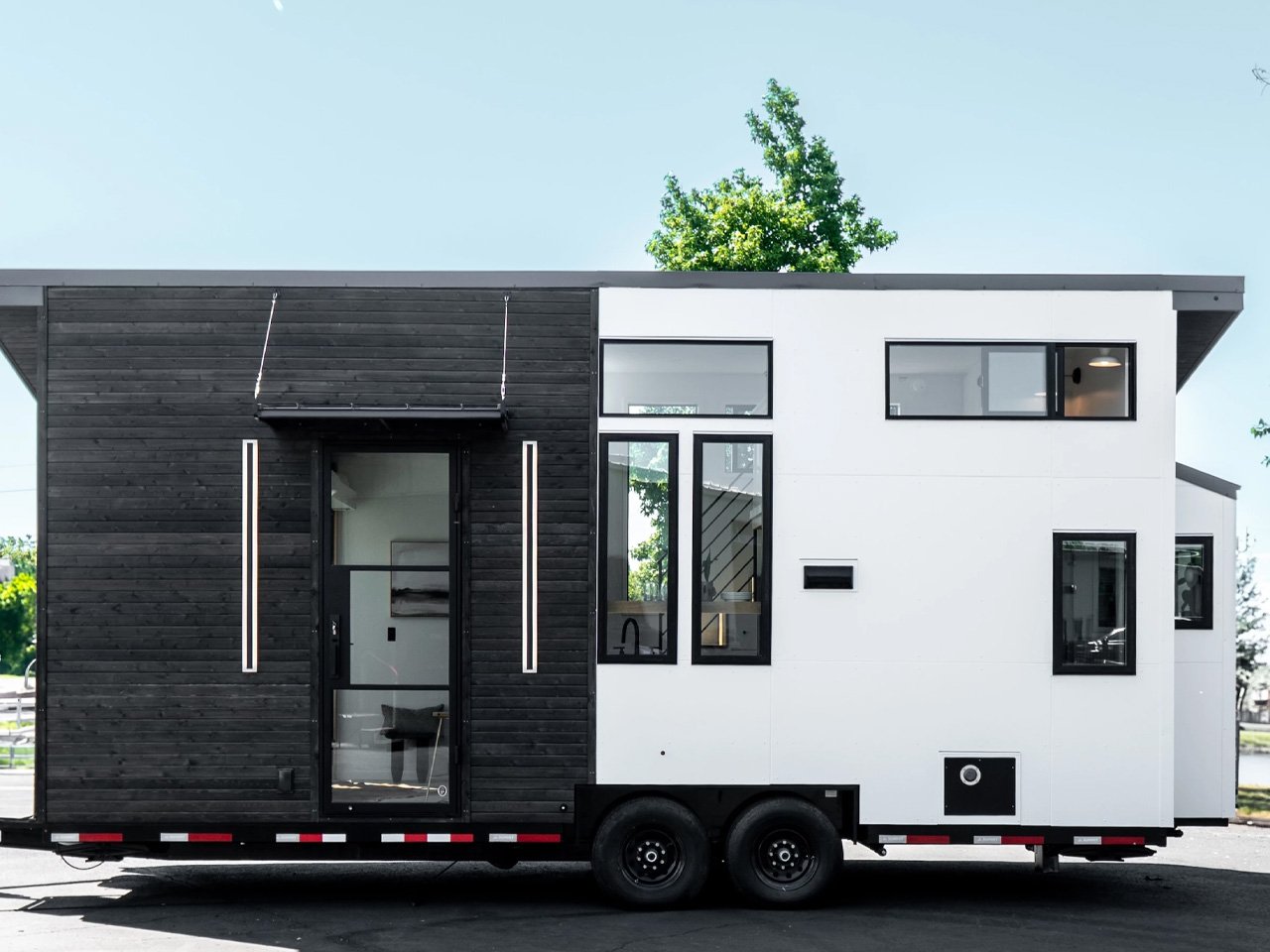The tiny house movement has found its latest champion in the Terra Urban, a 26-foot travel trailer that’s capturing attention across design circles for its clever approach to maximizing limited square footage. Built by Tru Form Tiny, this modern marvel tackles one of the biggest challenges in compact living: creating distinct living and sleeping areas without sacrificing comfort or functionality.
What makes the Terra Urban special is its groundbreaking elevating bed system. With the push of a button, the living room transforms into a bedroom as the bed glides down from the ceiling. This automated mechanism eliminates the need for a permanent bedroom, effectively doubling the usable floor space during the day. When raised, the bed completely disappears, creating an open, airy living environment that feels surprisingly spacious.
Designer: Tru Form Tiny
The design philosophy behind the Terra Urban shows a smart understanding of how we actually live. Instead of cramming traditional room layouts into a tiny space, Tru Form Tiny reimagined how spaces could work dynamically throughout the day. The result is a home that adapts to your schedule, providing generous living areas during the day and comfortable sleeping quarters at night.
Despite its compact footprint, the kitchen doesn’t compromise on functionality. It features a sink, small dishwasher, induction cooktop, fridge/freezer, microwave, and oven, plus a washer/dryer tucked neatly into the layout. A small rounded dining area built into the countertop provides eating space, while abundant cabinetry ensures plenty of storage. On the opposite side, the bathroom keeps things simple with a stone sink, flushing toilet, shower, and storage space.
For those seeking traditional sleeping quarters, a loft bedroom is situated above, accessible via a storage-integrated staircase. While the low ceiling is typical of loft designs, a lowered standing platform makes getting dressed easier, and additional storage maximizes every inch.
The trailer’s modern aesthetic sets it apart from traditional RVs and many tiny houses that lean heavily into rustic or cottage-style design. Clean lines, contemporary finishes, and thoughtful material choices create an environment that feels more like a boutique apartment than a mobile home. This design approach opens tiny living to people who might have dismissed it as too rustic or limiting.
The Terra Urban’s impact goes beyond its immediate occupants. As housing costs continue to rise and environmental awareness grows, solutions like this demonstrate how thoughtful design can make sustainable living both practical and desirable. The trailer’s mobility adds another appealing layer, offering freedom from traditional housing markets while maintaining comfort standards.
For those considering tiny living, the Terra Urban represents a significant step forward in what compact homes can offer. By solving the bedroom-living room challenge through innovative engineering rather than compromise, it opens new possibilities for how we think about space, function, and home itself.
FAQs
How much does the Terra Urban cost?
The Terra Urban starts at $89,000 as part of Tru Form Tiny’s M Series. However, fully customized Tru Form Tiny homes typically range between $100,000 and $200,000, depending on features and upgrades. The company offers flexible financing options for both the home and land. Additional costs include delivery, utilities setup, and any optional customizations.
How does the elevating bed system work, and is it reliable?
The Terra Urban features a motorized elevator bed that operates with the push of a button. The bed descends from the ceiling to transform the living room into a bedroom, then retracts completely when not needed, effectively doubling the usable floor space. Tru Form Tiny offers these motorized systems as one of its signature space-saving solutions. While specific maintenance details aren’t publicly available, the company’s focus on quality craftsmanship suggests they stand behind this key feature’s reliability.
What are the towing requirements and weight specifications?
Typical 26-foot tiny houses weigh between 13,000 and 18,000 pounds when fully loaded. You’ll need a heavy-duty pickup truck or SUV with a towing capacity that exceeds the house’s total weight. Most experts recommend the “80% rule” – only using 80% of your vehicle’s maximum towing capacity for safety. Essential requirements include trailer brake controls, extended mirrors, and a proper hitch system. The tongue weight should be 10-15% of the trailer’s total weight for safe handling and control.
The post This $89,000 Tiny House Has A Motorized Bed That Disappears Into The Ceiling first appeared on Yanko Design.

